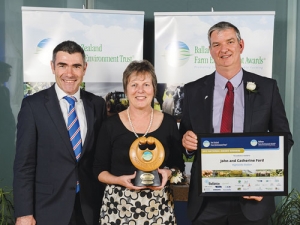Meat Industry Association CEO to Step Down
The Meat Industry Association of New Zealand (MIA) today announced that Chief Executive Officer Sirma Karapeeva has resigned from the role.
 John and Catherine Ford with Primary Industries Minister Nathan Guy, winners of the 2015 Gordon Stephenson trophy.
John and Catherine Ford with Primary Industries Minister Nathan Guy, winners of the 2015 Gordon Stephenson trophy.
The Ballance Farm Environment Awards open farmers to new networks they may not know about says national judging coordinator Andrea Hanna.
“We try to encourage all farmers to enter, whatever stage they are at. We like to promote them getting involved and starting a journey,” she says.
Entries for the 2016 Ballance Farm Environment Awards opened on August 1. Entry can mean farmers getting involved at a more informative level and understanding the resources available – for instance with regional councils, Hanna told Rural News.
The farmers get feedback reports at the end of each time; they keep these reports, refer back to them and build on the recommendations and comments from the judges. The reports cover the whole farm picture. Often the farmers who have re-entered over the years have ended up winning an award.
Although dairy farmers are facing tough times this year, she still encourages them to enter. “They have to keep interacting… they will get support. We can always put them in touch with different organisations to give them a hand or advice and it doesn’t always cost money.”
The farm environment awards raise awareness locally and overseas of good farming practices in New Zealand, she says.
“The rural urban gap is increasing because so many kids in the cities now don’t have the access to farms they used to have when an uncle or grandparent had a farm. You could always get out and have holidays on farms but that’s changing. Urban and rural are not interacting and that’s something we promote as well.”
Leading farmers from the competition are also encouraged to make presentations on rural issues to select committees in Parliament.
The winner of the Gordon Stephenson trophy, the national award, takes an overseas tour, picking a topic and researching it overseas and bringing back a paper to showcase their study. “It’s all about promoting NZ Agriculture Inc.”
Hanna says every farmer, including orchardists, vegetable growers and viticulturists, should give it a go. “Most people enter because they want high quality feedback on how their farming operation stacks up in environmental and economic sustainability,” she says.
Entering the free competition is as easy as filling out a form, available online, or via the mail if preferred.
The judging process is relaxed and friendly, and judges always take climatic factors into account.
Hanna says past entrants have described their participation as a highly worthwhile experience.
Be inspired
National title winners from Bay of Plenty, John and Catherine Ford, urge all farmers to enter the 2016 competition.
“We need to promote our industry by providing examples of the things farmers are doing to care for the environment,” says John.
He and Catherine and their staff found the judging process educational and inspirational.
“Our whole team bought into it, and it was a fantastic team-building exercise. We think every farmer will get something out of being involved in the awards. It gives you a huge confidence boost when the judges say you are doing a good job. And if you are not on the right track, the judges will direct you on how to get there.”
The awards prove sound environmental practises and good business management go hand in hand, the organisers say.
Farmers who take part are also encouraged to share ideas and innovations with the wider farming community.
The Meat Industry Association of New Zealand (MIA) today announced that Chief Executive Officer Sirma Karapeeva has resigned from the role.
The winners of the 2026 Hawke’s Bay/Wairarapa Dairy Industry Awards were announced at the annual awards dinner held at Copthorne Solway Park in Masterton on Thursday evening.
Environment Southland is welcoming this week’s decision by the Environmental Protection Authority (EPA) to approve the release of Blaptea elguetai, a leaf‑feeding beetle that will help control the highly invasive Chilean flame creeper.
This March, the potato industry is proudly celebrating International Women’s Day on 8 March alongside the International Year of the Woman Farmer, recognising the vital role women play across every part of the sector — from paddocks and packhouses to research, leadership, and innovation.
Fruit trader Seeka posted a record profit and returns to shareholders in 2025.
Recent weather events in the Bay of Plenty, Gisborne/Tairawhiti, and Canterbury have been declared a medium-scale adverse event.

OPINION: A mate of yours truly reckons rural Manawatu families are the latest to suffer under what he calls the…
OPINION: If old Winston Peters thinks building trade relations with new nations, such as India, isn't a necessary investment in…